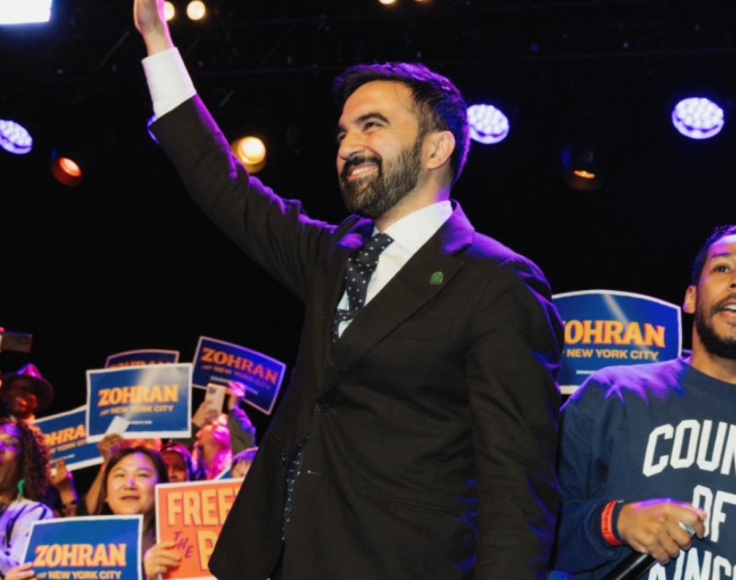America's New Reality: Muslim Mayor Zohran Mamdani's Rise Tests the Limits of Trump's Patriotism
The 34-year-old Democrat's landmark victory reshapes the political map — and challenges Trump's rhetoric on belonging.

It was more than just another blue victory on election night. It was a political and cultural tremor that rippled far beyond the skyscrapers of Manhattan. When 34-year-old Zohran Kwame Mamdani took the oath as New York City's first Muslim mayor, the city did not simply make history. It tested the boundaries of America's evolving identity.
President Donald Trump's response captured the unease spreading through conservative circles. On Truth Social, he wrote: 'TRUMP WASN'T ON THE BALLOT, AND SHUTDOWN, WERE THE TWO REASONS THAT REPUBLICANS LOST ELECTIONS TONIGHT,' citing unnamed pollsters.
Speaking later at the America Business Forum in Miami on Wednesday, the president reflected on the night's results, calling it a moment when 'the American people reclaimed our government and restored our sovereignty'.
Then, almost as an afterthought, he added a pointed remark about the city that defied him: 'We lost a little bit of sovereignty last night in New York, but we'll take care of it, don't worry about it.'
From Outsider to Insider
For decades, Muslims in the United States, particularly in New York, have lived under the long shadow of 9/11. They were scrutinised, stereotyped and often silenced. Now, a man whose faith once marked him as an outsider has been chosen to lead the very city that became ground zero for Islamophobia.
Mamdani's victory, as many analysts point out, is not just about politics. It is about belonging.
'It sends a powerful message that Muslims are not just part of this nation's civic fabric, we help shape it,' political scientist Youssef Chouhoud told The Times of Israel. 'For years, Muslim Americans worked to prove they belonged. Mamdani is showing they can lead.'
A Symbol of Representation
Born in Uganda to Indian parents, raised in Queens, and once a housing counsellor helping low-income families avoid eviction, Mamdani's journey to City Hall embodies the immigrant dream. His election is being hailed as a watershed for representation, especially for a community that has too often been painted as the 'other'.
For Muslim New Yorkers, the victory was deeply personal. 'For the first time in a very long time, I feel hope — as a Muslim, as a Democrat, as an American,' Pakistani-American physician Bukhtawar Waqas told the Associated Press.
She attended Mamdani's victory speech in Queens and said the diversity of people around her made her proud to call New York home.
Crowds of young progressives, migrant families and working-class supporters filled the Brooklyn Paramount Theatre on election night, waving flags and chanting, 'This is our city too.'
A Divided Reaction
But not everyone is celebrating. Mamdani's outspoken criticism of Israel's war in Gaza drew fire from Jewish leaders and pro-Israel groups during the campaign. Detractors accused him of fuelling division, while his supporters defended his right to speak out on humanitarian grounds.
Trump's post, viewed more than 12 million times, appeared to capitalise on these tensions. His choice of words, 'lost sovereignty', sparked a storm online, with some branding it a veiled jab at Mamdani's religion and immigrant roots.
'This isn't about sovereignty,' Wa'el Alzayat, CEO of Emgage Action, told AP. 'It's about fear — fear of seeing a Muslim man in power, and fear of what that represents to the old guard.'
A Turning Point for America
Twenty-four years after 9/11, New York's choice of a Muslim mayor has become a symbol of resilience and reinvention. For many, it signals that the narrative has shifted — from suspicion to inclusion, from outsider to insider.
Sylvia Chan-Malik, a professor at Rutgers University who teaches Islam in America, told AP that Mamdani's win allows 'a collective sigh of relief from Muslim New Yorkers, which will ripple across the country'.
Yet even Mamdani himself knows that symbolism is only half the battle. 'No more will New York be a city where you can traffic in Islamophobia and win an election,' he declared in his victory speech.
The Test Ahead
Mamdani has promised to freeze rents, expand free childcare and make public transport free — policies that could redefine the meaning of progressivism in one of the world's most expensive cities.
But beyond policy lies something deeper: a reckoning with what it means to be American. For some, Mamdani's win is a sign of progress. For others, it is a warning that the country they once knew is changing too fast.
Either way, one truth is clear. The son of Ugandan-Indian immigrants has forced America to confront a question it can no longer ignore: is it ready to be led by the very people it once feared?
© Copyright IBTimes 2025. All rights reserved.





















